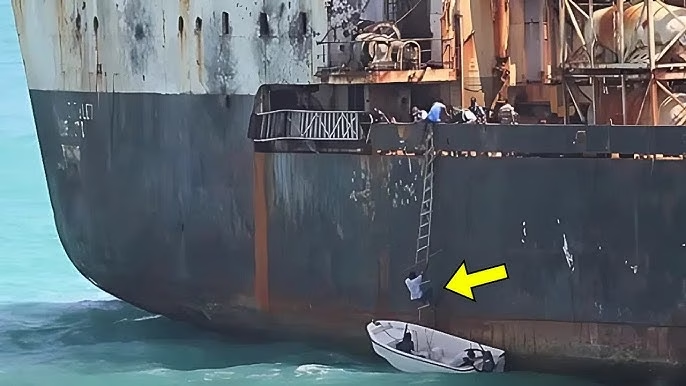On a quiet Sunday in October 2020, a massive oil tanker anchored just off the southern coast of England became the stage for a modern maritime siege—one that would end in a daring raid by one of the world’s most elite special forces and reveal the hidden human cost behind global shipping.
The Mayday Call That Rocked the Coast
It was just another day on the English Channel—until a frantic Mayday call shattered the calm. Aboard the Nave Andromeda, a 42,000-ton Liberian-flagged oil tanker, the ship’s captain had initiated a distress signal to British authorities. But this was no mechanical failure. The captain, his voice trembling with fear, reported that he had lost control of his ship—not to pirates, but to seven stowaways who had turned violent.
Inside the vessel’s citadel—a fortified safe room buried deep within the ship—the captain and all 22 crew members were in hiding, effectively prisoners on their own ship.
The hijacking was underway.
The Hidden World of Maritime Stowaways
To understand how this crisis began, one must look beneath the surface of global trade—into the invisible and often tragic world of maritime stowaways. Each year, thousands from impoverished or unstable nations, particularly in Africa, risk everything to board commercial vessels bound for Europe or North America. They hide in shipping containers, engine compartments, or even the rudder wells—often enduring weeks of suffocating heat, exposure to the elements, and hunger.
It’s a deadly gamble. Many never survive the journey. Those who do often face detention and deportation.
For the crews of these ships, discovering stowaways presents a painful dilemma. Maritime law mandates humanitarian aid—food, water, and medical attention. Yet stowaways also pose serious risks, from health concerns to security threats. And when desperation turns to aggression, a dangerous line can be crossed.
From Discovery to Desperation
The Nave Andromeda departed Lagos, Nigeria in early October 2020, loaded with crude oil and bound for a refinery in Southampton, England. Several days into the voyage, off the coast of Spain, the crew discovered seven Nigerian men hidden aboard.
As protocol dictates, the Greek captain provided food and locked them in a cabin. But as the ship neared the UK, tension began to boil. The men, realizing deportation was inevitable, grew increasingly agitated. They escaped their cabin, armed themselves with makeshift weapons, and began threatening the crew. Demands were shouted. Control was lost.
In a decisive move, the captain ordered all crew members into the citadel, maintaining control over the ship’s engines and navigation systems—but surrendering the deck.
From there, he sent out the distress call that would soon trigger a full-blown national security crisis.
A National Response and the Shadows of the SBS
The British Coast Guard swiftly relayed the call up the chain. Within hours, the UK’s emergency COBRA committee was convened. The threat was not just to the lives of those onboard—but to the coastline itself. A fully-laden oil tanker, if deliberately run aground, could unleash a catastrophic environmental disaster.
As contact with the stowaways failed and tension dragged into the night, the British government made a critical decision: military intervention.
Enter the Special Boat Service (SBS)—one of the most elite and secretive military units in the world. The Naval counterpart to the SAS and the UK’s version of the U.S. Navy SEALs, the SBS specializes in maritime counterterrorism, ship-boarding, and hostage rescue. Operating under the motto “By Strength and Guile,” their operations are rarely public—and almost always flawless.
Operation Nimbus: A Daring Night Raid
As darkness fell, Operation Nimbus was launched.
Four helicopters—Merlins and Wildcats—lifted off from British bases, carrying a 16-man SBS team. Flying low across the channel, invisible against the night sky, they reached the Nave Andromeda. With the tanker still moving through choppy waters, the commandos fast-roped onto the deck.
In just nine minutes, they secured the 750-foot vessel without a single shot fired.
The stowaways were detained. The ship was swept, secured, and cleared. The SBS team made their way to the citadel to inform the crew: the nightmare was over.
After more than 10 hours of uncertainty, the 22 crew members emerged shaken—but unharmed.
Justice or Mercy? A Legal and Moral Quandary
The seven stowaways were arrested under suspicion of attempting to hijack the vessel by force. Initially, the act was investigated as potential maritime piracy—a serious crime under international law.
But the deeper investigators dug, the more nuanced the case became. These were not terrorists or pirates. They were not criminals seeking ransom or riches. They were desperate men, terrified of being sent back to the life they had fled. While their actions endangered lives and triggered a national security operation, the courts ultimately concluded there was no intent to truly seize or control the ship in a criminal sense.
In the end, charges were dropped.
A Story Beyond Headlines
The story of the Nave Andromeda is many things at once.
It is a high-stakes maritime thriller, complete with a covert special forces raid and a flawless tactical rescue.
It is a testament to training and leadership, from a captain who followed protocol to soldiers who acted with speed and precision.
And it is a sobering human story, one that forces us to confront the complexities of global migration, inequality, and the invisible world of maritime desperation.
This wasn’t just a standoff on the high seas. It was a reminder that every shipping lane, every container ship, carries not just cargo—but the hopes, fears, and tragedies of people caught in the undertow of a globalized world.
Final Thoughts
While the headlines may fade, the questions raised by the Nave Andromeda incident remain urgent. What responsibility does the developed world bear for those who risk everything to reach its shores? How do we balance compassion with security? And what can be done to prevent future crises—not just at sea, but at the source?
These are not easy questions. But they are ones we can no longer afford to ignore.

